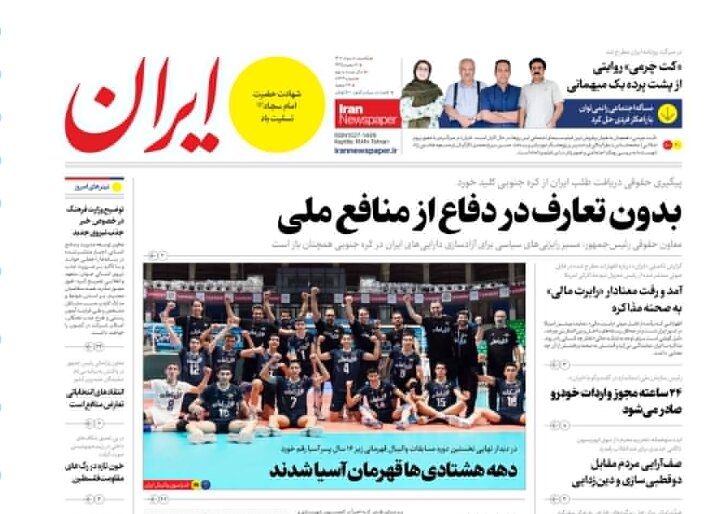Failure of “maximum pressure” campaign

In a commentary the Iran newspaper analyzed the failure of Washington’s “maximum pressure” campaign against the Islamic republic. It wrote: The dismissal of Malley and America's efforts to persuade Tehran to re-engage in negotiations primarily intended to revive the 2015 nuclear deal, shows the American decision-making system has failed.
It is needless to say that Washington neither can nor wants to stand besides Israel if the regime decides to wage war against Iran. The U.S. experienced further impotence as things underwent rapid changes in Iran. The Islamic Republic’s flurry of diplomacy, acceleration of nuclear activities, restoration of ties with certain Arab states and improvement of relations with Asian ones have brought about significant achievements for Tehran. After Washington realized that its so-called “maximum pressure” campaign has failed, it sent Brett McGurk to Muscat to pursue indirect negotiations with Iran within the framework of the JCPOA. This move can be seen as an attempt to stem a nuclear conflict with Iran and also preserve the chance to reach some kind of diplomatic agreement with Iran.
Kayhan: Iran on agenda of American-Australian diplomats and military officials
Kayhan analyzed the meeting between the United States and Australia in which Iran was the main topic. It said: The claim by the U.S. State Department that Iran plays a destabilizing role in the region is unbelieving. This is while Washington has been the biggest source of instability in West Asia by selling tens of billions of dollars in arms to various countries and provoking arms race, is directly or indirectly involved in regional wars, and staying silent on Israeli atrocities against Palestinians. Washington has weakened security in West Asia and made some countries unstable for the years to come. Iranian authorities have repeatedly warned against the provocative activities of the United States in international waters including its intervention with legal seizures of some ships by Iran that were involved in smuggling activities. The U.S. also likes to use the pretext of “human rights violation” to pressure Iran. Iran's authorities have previously criticized such interventionist statements from the West and by pointing out the imperialistic history of these countries, advised them to think twice before accusing anyone of human rights violation.
Vatan-e-Emrooz: BRICS on path of de-dollarization
In a commentary, Vatan-e-Emrooz addressed the de-dollarization policy of the BRICS countries and wrote: The U.S. dollar has become a weapon, that is why countries are gradually abandoning dollar in trade ties and the BRICS payment system of the "new non-Western world" will replace the financial messaging network of SWIFT. BRICS countries are looking to trade in national currencies and are trying to establish a common payment mechanism to reduce dependence on the Western financial systems and currencies, especially the American dollar. The creation of a new payment mechanism can have a great impact in short term. Launching the new BRICS currency can have great effects on international financial systems, the most important of which is weakening the status of the dollar in global trade exchanges. The gradual development of the BRICS currency begins with the creation of an "accounting unit" between the member countries, and eventually, it can replace the dollar in the world's major economies and become the turning point of new markets.
Hamshahri: Are Saudis distancing themselves from Iran, China and Russia?
In a note, Hamshahri discussed the talks between Jake Sullivan and Bin Salman in Jeddah. The paper wrote: Upon the thaw of ties between Riyadh and Tehran after seven years of disconnection, and with the deepening of commercial, political and even military relations between the Arab country and Beijing, the relations been Washington and Riyadh have somehow been diminished. Biden is negotiating with Saudi Arabia in the runup to the 2024 elections, but the Saudis have three demands from America: a joint defense pact, having a peaceful nuclear program and the purchase of advanced weapons, especially the THAAD missile system and F-35 stealth fighters. Saudi Arabia, which has strengthened its position in Arab and Islamic countries, has made great strategic progress by restoring its relationship with Iran and refusing to abandon this policy at the request of the United States. Last December Riyadh rolled out red carpet for the Chinese president. In fact, Saudi Arabia no longer needs the United States; it can follow up on its plans by receiving help from China, Russia, and even North Korea without any pre-conditions.
Leave a Comment